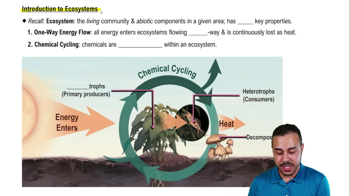What community property does the red arrow in the model represent?
a. Low resilience
b. High resilience
c. Low resistance
d. High resistance
 Verified step by step guidance
Verified step by step guidance Verified video answer for a similar problem:
Verified video answer for a similar problem:



 3:56m
3:56mMaster Conservation Biology and Biodiversity with a bite sized video explanation from Jason
Start learning